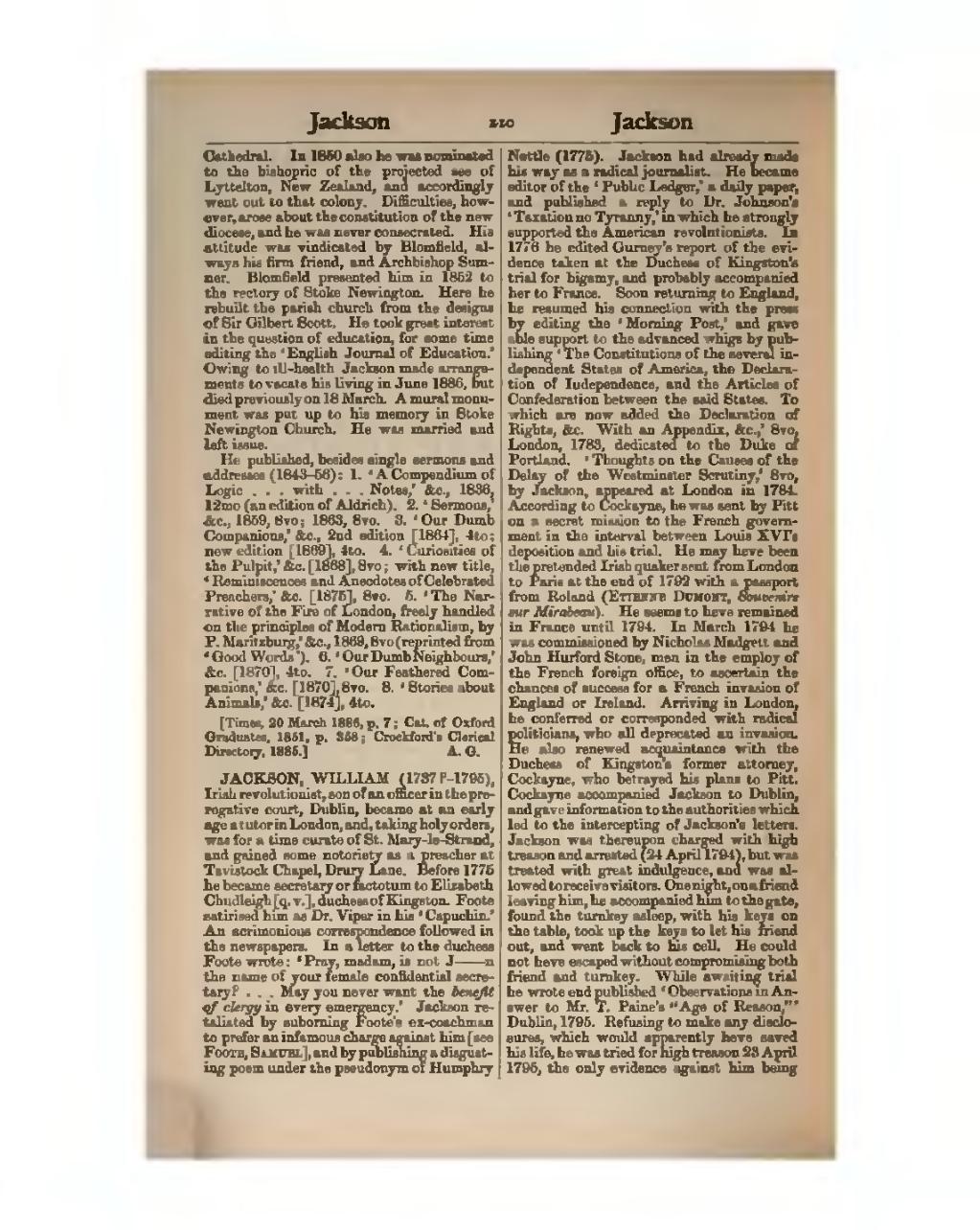Cathedral. In 1850 also he was nominated to the bishopric of the projected see of Lyttelton, New Zealand, and accordingly went out to that colony. Difficulties, however, arose about the constitution of the new diocese, and he was never consecrated. His attitude was vindicated by Blomfield, always his firm friend, and Archbishop Sumner. Blomfield presented him in 1852 to the rectory of Stoke Newington. Here he rebuilt the parish church from the designs of Sir Gilbert Scott. He took great interest in the question of education, for some time editing the ‘English Journal of Education.’ Owing to ill-health Jackson made arrangements to vacate his living in June 1886, but died previously on 18 March. A mural monument was put up to his memory in Stoke Newington Church. He was married and left issue.
He published, besides single sermons and addresses (1843–56):
- ‘A Compendium of Logic … with … Notes,’ &c., 1836, 12mo (an edition of Aldrich).
- ‘Sermons,’ &c., 1859, 8vo; 1863, 8vo.
- ‘Our Dumb Companions,’ &c., 2nd edition [1864], 4to; new edition [1869], 4to.
- ‘Curiosities of the Pulpit,’ &c. [1868], 8vo; with new title, ‘Reminiscences and Anecdotes of Celebrated Preachers,’ &c. [1875], 8vo.
- ‘The Narrative of the Fire of London, freely handled on the principles of Modern Rationalism, by P. Maritzburg,’ &c., 1869, 8vo (reprinted from ‘Good Words’).
- ‘Our Dumb Neighbours,’ &c. [1870], 4to.
- ‘Our Feathered Companions,’ &c. [1870], 8vo.
- ‘Stories about Animals,’ &c. [1874], 4to.
[Times, 20 March 1886, p. 7; Cat. of Oxford Graduates, 1851, p. 358; Crockford's Clerical Directory, 1885.]
JACKSON, WILLIAM (1737?–1795), Irish revolutionist, son of an officer in the prerogative court, Dublin, became at an early age a tutor in London, and, taking holy orders, was for a time curate of St. Mary-le-Strand, and gained some notoriety as a preacher at Tavistock Chapel, Drury Lane. Before 1775 he became secretary or factotum to Elizabeth Chudleigh [q. v.], duchess of Kingston. Foote satirised him as Dr. Viper in his ‘Capuchin.’ An acrimonious correspondence followed in the newspapers. In a letter to the duchess Foote wrote: ‘Pray, madam, is not J——n the name of your female confidential secretary? … May you never want the benefit of clergy in every emergency.’ Jackson retaliated by suborning Foote's ex-coachman to prefer an infamous charge against him [see Foote, Samuel], and by publishing a disgusting poem under the pseudonym of Humphry Nettle (1775). Jackson had already made his way as a radical journalist. He became editor of the ‘Public Ledger,’ a daily paper, and published a reply to Dr. Johnson's ‘Taxation no Tyranny,’ in which he strongly supported the American revolutionists. In 1776 he edited Gurney's report of the evidence taken at the Duchess of Kingston's trial for bigamy, and probably accompanied her to France. Soon returning to England, he resumed his connection with the press by editing the ‘Morning Post,’ and gave able support to the advanced whigs by publishing ‘The Constitutions of the several independent States of America, the Declaration of Independence, and the Articles of Confederation between the said States. To which are now added the Declaration of Rights, &c. With an Appendix, &c.,’ 8vo, London, 1783, dedicated to the Duke of Portland. ‘Thoughts on the Causes of the Delay of the Westminster Scrutiny,’ 8vo, by Jackson, appeared at London in 1784. According to Cockayne, he was sent by Pitt on a secret mission to the French government in the interval between Louis XVI's deposition and his trial. He may have been the pretended Irish quaker sent from London to Paris at the end of 1792 with a passport from Roland (Etienne Dumont, Souvenirs sur Mirabeau). He seems to have remained in France until 1794. In March 1794 he was commissioned by Nicholas Madgett and John Hurford Stone, men in the employ of the French foreign office, to ascertain the chances of success for a French invasion of England or Ireland. Arriving in London, he conferred or corresponded with radical politicians, who all deprecated an invasion. He also renewed acquaintance with the Duchess of Kingston's former attorney, Cockayne, who betrayed his plans to Pitt. Cockayne accompanied Jackson to Dublin, and gave information to the authorities which led to the intercepting of Jackson's letters. Jackson was thereupon charged with high treason and arrested (24 April 1794), but was treated with great indulgence, and was allowed to receive visitors. One night, on a friend leaving him, he accompanied him to the gate, found the turnkey asleep, with his keys on the table, took up the keys to let his friend out, and went back to his cell. He could not have escaped without compromising both friend and turnkey. While awaiting trial he wrote and published ‘Observations in Answer to Mr. T. Paine's “Age of Reason,”’ Dublin, 1795. Refusing to make any disclosures, which would apparently have saved his life, he was tried for high treason 23 April 1795, the only evidence against him being
